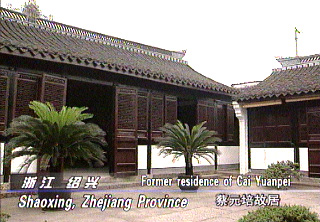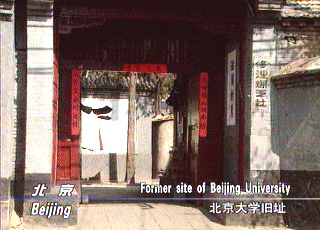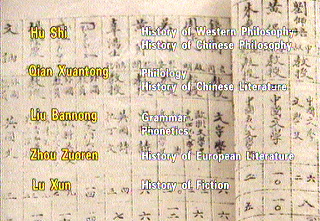 |
|
Adolescent China (3)
Beijing University |
| CCTV.COM 2002-10-30 13:10:15 |
|
 The snow fell in thick flakes on January 4, 1917 when Cai Yuanpei came to Beijing University as its new president. Many veteran workers on the campus remembered clearly how Cai Yuanpei came to the university. When they bowed to the new president, Cai Yuanpei took off his hat and returned a bow to the workers in a serious manner. The snow fell in thick flakes on January 4, 1917 when Cai Yuanpei came to Beijing University as its new president. Many veteran workers on the campus remembered clearly how Cai Yuanpei came to the university. When they bowed to the new president, Cai Yuanpei took off his hat and returned a bow to the workers in a serious manner.
A week earlier, the teaching staff and students of Beijing University had heard the news. They wondered what the new president, once a member of the Imperial Academy, would bring to Beijing University.
Cai Yuanpei finished his orthodox Confucian education in his hometown. When he was 18, he had read more than 100,000 volumes at the Guyue Library.
 In about a dozen of years after that, he became a palace graduate and a member of the Imperial Academy. He reached the top of feudal intellectuals at the age of 26. In about a dozen of years after that, he became a palace graduate and a member of the Imperial Academy. He reached the top of feudal intellectuals at the age of 26.
After the coup in 1898, he joined an assassination group organized by Chinese students in Japan, secretly made bombs and carried on anti-Qing activities. Soon afterwards Cai Yuanpei and others organized the Restoration Society. In 1905, he joined the Chinese Revolutionary League organized by Sun Yat-sen. He was known as one of the “Four Veterans of the Republic of China”. In 1907 when he was nearly 40, Cai Yuanpei went to Germany for a work-study programme. After the founding of the Republic of China, he was the first minister of education and a cabinet member of the Provisional Government headed by Sun Yat-sen.
 But all these were outshone by the brilliant achievements he gained when he held the office of the president of Beijing University. But all these were outshone by the brilliant achievements he gained when he held the office of the president of Beijing University.
Cai Yuanpei came to Beijing University for the second time. He had been here for the first time to attend the opening ceremony of Beijing University, renamed from the Metropolitan University after the founding of the Republic of China. He was the Minister of Education. The former Metropolitan University was located on present-day Jingshan Dongjie Street. In those days, Beijing University had a bureaucratic style of work. Some of the teaching staff members used to be bureaucrats of the government controlled by the Northern Warlords. Many others were conservatives or had neither learning nor ability. There was no lack of students who had servants, played mahjong, drank and made merry in the company of courtesans and boasted famous actors or actresses. They were not interested in learning at all. Some teaching staff members and students often visited brothels. When Cai Yuanpei came to Beijing University, the state of affairs had not been remedied thoroughly.
Cai Yuanpei came to Beijing University after careful consideration. On the 9th day of his term of office, he appointed Chen Duxiu the Dean of Liberal Arts.
From certificates of appointment, we saw the names of many contributors to the “New Youth”. Cai Yuanpei did not exclude extremely conservative scholars. Gu Hongming, an eccentric man, kept his long plait when he appeared on the platform.
 We can find many familiar names from the class schedule which is well preserved. This was the most illustrious group of teaching staff members at Beijing University. We can find many familiar names from the class schedule which is well preserved. This was the most illustrious group of teaching staff members at Beijing University.
Propagators of new ideas and defenders of traditional Chinese national culture gathered together at Beijing University. Confrontation of ideas and academic exchanges brought forth brilliance of reason.
Cai Yuanpei, an outstanding president, and his university ushered in a new era with unprecedented splendour.
The young students were deeply affected by a spirit of equality and freedom. Some students represented by Luo Jialun and Fu Sinian put out publications and expressed their views in various ways. Beijing University was the most active space of ideas in China in those days. Cai Yuanpei followed a principle of free thinking and a tolerant line of reform. In a very short period of time, he miraculously turned the institution that had functioned almost like a government office in feudal China into the highest institute of learning in China worthy of the name. The spirit and character of a modern university were a valuable heritage of the 20th century to be handed down from generation to generation.
|
|
Editor: Liu Baoyin CCTV.com
|
|
|
|
|
|
 |









